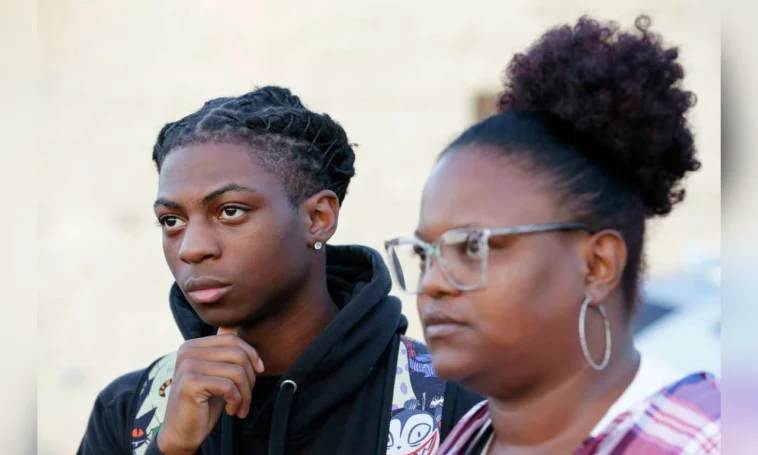Barbers Hill Independent School District in Texas is divided over the punishment of Black student Darryl George for sporting locs. The uproar escalated when the district’s superintendent, Greg Poole, took out a full-page Houston Chronicle ad justifying George’s haircut suspension.
Poole stated in the commercial, “Being an American requires conformity with the positive benefit of unity,” arguing that the school district promoted unity. He also revealed that the district sought a state district court declaratory judgment to confirm its interpretation.
“Being an American requires conformity with the positive benefit of unity.” Barbers Hill ISD Superintendent Greg Poole
George’s unpinned locs below his eyebrows are the issue. Multiple suspensions led to his relocation from high school to EPIC, a disciplinary alternative education program, for almost a month. He was suspended for “failure to comply” with campus and classroom rules, according to the principal.
Poole stressed the district’s support for local control, saying George’s move from a place with longer hair influenced the decision. Local governments should set policies, goals, and expectations, he said.
George’s family filed a formal complaint with the Texas Education Agency and a federal civil rights lawsuit against Governor Greg Abbott, Attorney General Ken Paxton, and the school district after the suspension. The case claims a violation of the state’s CROWN Act, which prohibits Black hair texture and style discrimination.
Allie Booker, Darryl George’s attorney, worried about expulsion during a federal lawsuit hearing. She praised his resilience, noting, ” ‘I’m not cutting my hair, but I can’t believe I’m going through this,”
The CROWN Act, House Bill 567, banned discrimination against natural and protective Black hairstyles on September 1, 2021. Over 20 states have enacted the CROWN Act to ban hairstyle discrimination in schools and workplaces.
New Jersey Representative Bonnie Watson Coleman is pushing for the Senate to enact the measure nationally to create a respected and open environment for natural hair.
The controversial suspension and following actions highlight the ongoing fight for equality, opposing discriminatory rules, and protecting cultural expressions, especially in schools.
The suspension of Darryl George and Superintendent Greg Poole’s response have sparked a conversation on cultural acceptance, individual expression, and school regulations’ impact on these narratives. The debate around George’s locs ban has highlighted the conflict between cultural identity and scholastic norms.
Critics say the school district’s focus on conformity ignores variety and cultural expression. Many states, including Texas, have passed the CROWN Act to recognize Black people’s hairstyle-based discrimination. This law promotes an inclusive atmosphere where natural and protective hairstyles are not discriminated against.
George’s suspension and family’s legal case highlight the wider repercussions of cultural insensitivity in schools. The case against Governor Greg Abbott, Attorney General Ken Paxton, and the school system raises questions about state leadership in inclusive policies and student protection from discrimination.
In an age of diversity, equity, and inclusion, Barbers Hill Independent School District’s locs dispute illustrates the difficulties of addressing cultural differences in education. Superintendent Poole noted the conflict between local control and legislative attempts like the CROWN Act, highlighting the continual battle to balance individual expression and institutional standards.
The court battle started by George’s family highlights the necessity to review school policy to ensure equality and cultural diversity. It calls for a critical examination of how these policies are created, enforced, and affect different pupils.
Representative Bonnie Watson Coleman’s national campaign emphasizes the need to eliminate hairstyle-based prejudice. The nationwide appeal for the Senate to enact the CROWN Act indicates a commitment to ending discrimination and creating a more inclusive society.
The controversy sparks discussions about cultural sensitivity, individual rights, and educational institutions’ responsibility to accept and celebrate students’ diverse identities, including hairstyles. This case and others may shape the American school system’s cultural acceptance discussion.:



